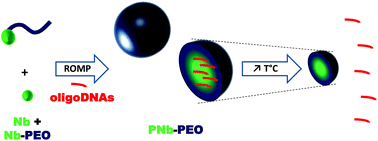当前位置:
X-MOL 学术
›
Polym. Chem.
›
论文详情
Our official English website, www.x-mol.net, welcomes your
feedback! (Note: you will need to create a separate account there.)
Thermosensitive polynorbornene poly(ethylene oxide) nanoparticles loaded with oligoDNAs: an innovative approach for acting on cancer-associated pain†
Polymer Chemistry ( IF 4.1 ) Pub Date : 2017-12-12 00:00:00 , DOI: 10.1039/c7py01889d L. Pichavant 1, 2, 3, 4, 5 , M. J. López-González 4, 6, 7, 8, 9 , A. Favereaux 4, 6, 7, 8, 9 , V. Héroguez 1, 2, 3, 4, 5
Polymer Chemistry ( IF 4.1 ) Pub Date : 2017-12-12 00:00:00 , DOI: 10.1039/c7py01889d L. Pichavant 1, 2, 3, 4, 5 , M. J. López-González 4, 6, 7, 8, 9 , A. Favereaux 4, 6, 7, 8, 9 , V. Héroguez 1, 2, 3, 4, 5
Affiliation

|
DNA oligonucleotides (oligoDNAs) have been recently identified as a novel class of therapeutic tools for acting on the cancer-associated pain. Polymeric nanoparticles (NPs) are interesting entities to entrap and protect such molecules to allow their carriage through the bloodstream to the spinal cord. In this contribution, original thermosensitive NPs are designed to deliver oligoDNAs only at a temperature close to the physiological one. These core/shell NPs, having a hydrophobic polynorbornene (PNb) core and a hydrophilic poly(ethylene oxide) (PEO) shell, have been synthesized in the presence of oligoDNA molecules. The use of the PEO shell allows the furtivity of the NPs and enhances the circulation half-life of the NPs whereas an increase in the temperature higher than the glass temperature (Tg) of the PNb (close to 37 °C) involves an increase in the mobility of the hydrophobic polymer chains which implies a contraction of the NP core and the release of the oligoDNA molecules. In this paper the influence of the NP chemistry (presence of a crosslinker; functionalization of the NPs with glucosamine molecule) on both the entrapping rates and the thermosensitive release kinetics of the oligoDNA molecules is presented. The ability of the NPs to be internalized inside neuronal cells has also been shown by using Rhodamine functionalized NPs.
中文翻译:

寡聚DNA负载的热敏聚降冰片烯聚环氧乙烷纳米颗粒:一种用于治疗与癌症相关的疼痛的创新方法†
DNA寡核苷酸(oligoDNAs)最近已被确定为一类新型的治疗工具,可用于治疗与癌症相关的疼痛。聚合纳米颗粒(NPs)是有趣的实体,可以捕获和保护此类分子以使其通过血流输送到脊髓。在这种贡献中,原始的热敏NP被设计为仅在接近生理温度的温度下递送寡DNA。这些具有疏水性聚降冰片烯(PNb)核和亲水性聚环氧乙烷(PEO)壳的核/壳NPs是在寡聚DNA分子存在下合成的。PEO壳的使用允许NP的专一性并延长NP的循环半衰期,而温度的升高高于玻璃温度(T g的PNb(接近37°C)会增加疏水性聚合物链的迁移率,这意味着NP核的收缩和oligoDNA分子的释放。在本文中,提出了NP化学(交联剂的存在; NPs用氨基葡萄糖分子官能化)对寡聚DNA分子的包封率和热敏释放动力学的影响。通过使用罗丹明官能化的NP也已经显示出NP被内在神经元细胞内的能力。
更新日期:2017-12-12
中文翻译:

寡聚DNA负载的热敏聚降冰片烯聚环氧乙烷纳米颗粒:一种用于治疗与癌症相关的疼痛的创新方法†
DNA寡核苷酸(oligoDNAs)最近已被确定为一类新型的治疗工具,可用于治疗与癌症相关的疼痛。聚合纳米颗粒(NPs)是有趣的实体,可以捕获和保护此类分子以使其通过血流输送到脊髓。在这种贡献中,原始的热敏NP被设计为仅在接近生理温度的温度下递送寡DNA。这些具有疏水性聚降冰片烯(PNb)核和亲水性聚环氧乙烷(PEO)壳的核/壳NPs是在寡聚DNA分子存在下合成的。PEO壳的使用允许NP的专一性并延长NP的循环半衰期,而温度的升高高于玻璃温度(T g的PNb(接近37°C)会增加疏水性聚合物链的迁移率,这意味着NP核的收缩和oligoDNA分子的释放。在本文中,提出了NP化学(交联剂的存在; NPs用氨基葡萄糖分子官能化)对寡聚DNA分子的包封率和热敏释放动力学的影响。通过使用罗丹明官能化的NP也已经显示出NP被内在神经元细胞内的能力。











































 京公网安备 11010802027423号
京公网安备 11010802027423号